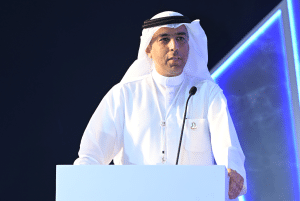
The MEXC Global has recently achieved the title of ‘Best Crypto Exchange in Asia’ at the Crypto Expo Dubai held in Dubai. From the bear market in 2018, to the rapid rise in 2019, to the expansion into global market in 2020, MEXC has now gained 5% of the global digital asset trading market.
The MEXC entered the Middle East market last year and is now the top trading platform in the region in terms of trading volume.
“Since the second half of this year, we have started to focus on the Arabic market,” said Sand, Vice President and Head of Middle East and South America of MEXC.
“Since 2020, we have started to lay out the global market and set the global compliance operation strategy. In terms of global market expansion, we have received licenses from five countries, including Estonia, the United States, Australia, Canada, and Switzerland. We are one of the most licensed platforms in the world for crypto-currency trading operations,” Sand told media.
He further mentioned that the MEXC is one of the major crypto-currency exchanges in the world. Compared to other exchanges, MEXC pays more attention to a good community culture and insists on listening to users’ feedback to make continuous improvement.
“At present, many company executives and even our founders pop by the community every day to answer various questions from users.”
“The MEXC has agile mobility and the ability to provide one-stop trading services for spot, futures, margin, and ETF trading. MEXC is currently the platform with the most comprehensive spot trading categories with extremely rapid launch of new projects on the entire network.”
“Almost all the leading projects, such as Web3.0 cross-chain leader Polkadot, decentralised trading leader UniSwap, Metaverse leader Axie Infinity and hundreds of others, were launched first on MEXC’” Sand said.
“It is also mentioned that the year 2021 was a very fast-growing year for the crypto-currency market, and the market cap of the whole market has grown rapidly. In the future, more and more mainstream institutions will focus on and enter this field,” he added.
Responding to a question of Metaverse, he said “I think the metaverse is an area that both Internet companies and the crypto-currency market must pay attention to. In the metaverse, there will not be only social network companies like Facebook (Meta), but any business in the future can be expanded with the metaverse as a carrier, which will be an upgrade to the Internet.”
“For example, in terms of social experience, we used to be able to text and make video calls on the Internet remotely, but in the metaverse our own virtual characters can communicate face to face in the same space. The shopping experience of e-commerce will also be different, etc,” he concluded.
Meanwhile, according to BarclayHedge, a division of Backstop Solutions global cryptocurrency funds racked up steep gains last year after most digital currencies soared in price, led by bitcoin and ether amid strong institutional interest and greater acceptance from regulators worldwide.
The BarclayHedge cryptocurrency traders index was up 138.1% for 2021, according to data the firm posted on Friday, showing results for about 39 funds, or less than 50% of the digital asset management firms it tracks. That followed record gains of 173% in 2020, as crypto funds benefited from extreme volatility that the coronavirus pandemic stoked across financial markets.
Bitcoin gained 60% in 2021 as it hit a record peak of $69,000 in November, while ether, the token used for the Ethereum blockchain, surged roughly 400%.
“There is an air of legitimacy now. Bitcoin is no longer viewed as an esoteric digital currency used only on the fringes by techies and cypherpunks,” according to CoinDesk’s annual crypto and blockchain review for 2021.
For the month of December, however, crypto funds showed losses of around 11%, as bitcoin and ether slumped as well. Bitcoin dropped 19% last year, while ether fell 20%.
“Crypto was the only sub-sector that didn’t make money in December, as many of the industry’s headline assets suffered whiplash from a sharp price downturn,” said Ben Crawford, head of research at BarclayHedge.
Crypto’s more traditional cousin, foreign exchange, on the other hand, turned in modest returns in 2021.
BarclayHedge’s currency trader’s index showed a gain of 2.2% last year, based on 60% of funds that reported.
Currently there are 40 FX programs tracked by BarclayHedge.
The 2021 gain for FX funds followed a 4% rise in 2020. Returns were subdued last year as global central banks kept a lid on interest rates, depressing volatility.
Currency funds’ returns, meanwhile, showed an anemic 0.23% rise in December.
In a separate development, Kazakhstan may no longer be the bitcoin sanctuary it once was, according to some big miners who are looking to leave the global crypto hub following internet shutdowns last week that compounded fears about tightening regulation.
The government web shutdowns during an explosion of unrest in the country, the world’s second-largest centre for mining, caused bitcoin’s global computing power to drop around 13% as data centres used to produce the cryptocurrency were knocked offline.
Alan Dorjiyev of the National Association of Blockchain and Data Center Industry in Kazakhstan, which represents 80% of legal mining companies in the country, said most crypto producers were now back online.
Yet the resumption of operations may belie problems to come for the fast-growing Cryptocurrency industry, according to four major miners interviewed by Reuters, with some saying they or their clients may look for other countries to operate in.
The internet outage compounded growing concerns about the stability and prospects of the business as tighter government oversight looms, the miners said.
Vincent Liu, a miner who moved operations to Kazakhstan from China to take advantage of the country’s cheap power, said the changing environment had led him to look at shifting operations to North America or Russia.
“Two or three years earlier, we called Kazakhstan a paradise of the mining industry because of the stable political environment and stable electricity,” said Liu.












